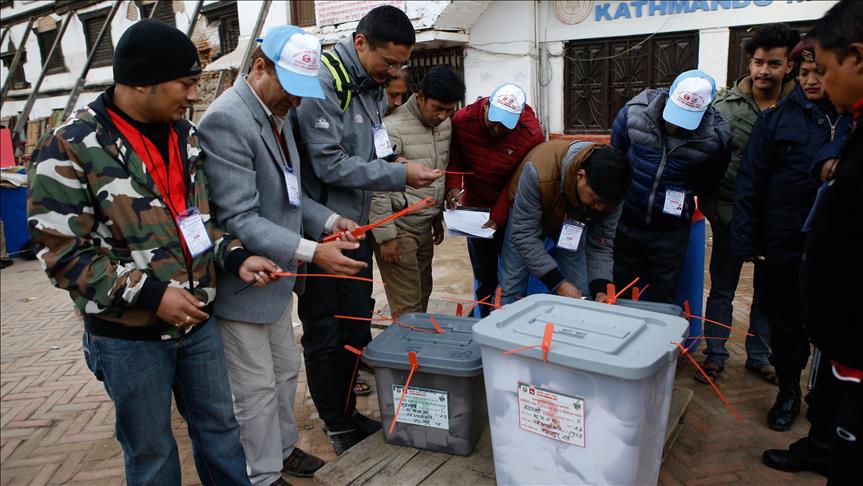Communists come first in Nepal’s elections
Alliance between 2 largest communist parties poised to win simple majority in 1st general elections under new constitution
 Nepalese election commission officers wrap ballot boxes after voting ended at a polling station during the parliamentary and provincial elections in Kathmandu, Nepal on December 7, 2017. Second round of voting for parliament and the provincial assemblies under the new constitution began on Thursday in the country's 45 districts. ( Sunil Pradhan - Anadolu Agency )
Nepalese election commission officers wrap ballot boxes after voting ended at a polling station during the parliamentary and provincial elections in Kathmandu, Nepal on December 7, 2017. Second round of voting for parliament and the provincial assemblies under the new constitution began on Thursday in the country's 45 districts. ( Sunil Pradhan - Anadolu Agency )
By Deepak Adhikari
KATHMANDU, Nepal
An alliance of two communist parties is poised for a victory in Nepal’s first elections for national parliament and provincial assemblies under a new constitution, official results said Tuesday.
Together, the alliance of the Communist Party of Nepal (Unified Marxist-Leninist) or UML and the Communist Party of Nepal (Maoist Centre) won 113 seats in parliament, while the ruling Nepali Congress party secured only 22.
The communist alliance is expected to win a simple majority and form a coalition government early next year.
Their strong showing at the polls was credited to a promise of a stable government after years of turbulence marked by frequent changes in government.
Most senior ruling party leaders, once the largest in parliament, were defeated by their leftist opponents. Critics blamed a poor campaign and failure to keep its promises for the party’s fall.
“Nepal’s politics saw polarization. It was divided between a left force and liberal bloc,” said Yogesh Bhattarai, who won a seat for the UML.
“Until now, no government has completed a five-year term. But our government will complete its tenure. Our priority now will be economic growth and infrastructure development in the country,” he said.
Nepal follows a mixed voting system including proportional representation and direct election aimed at providing greater representation to marginalized groups such as women and Madhesis, people of the southern plains.
The country held general elections in two phases -- on Nov. 26 and Dec. 7 -- for the 275-member federal parliament. Voters also cast ballot for 550 members of seven provincial assemblies across the country.
The voting culminated the country’s political journey that began in 2006 following a peace deal between former rebel Maoists and the government, after a 10-year insurgency that claimed the lives of 16,000 people.
Anadolu Agency website contains only a portion of the news stories offered to subscribers in the AA News Broadcasting System (HAS), and in summarized form. Please contact us for subscription options.






